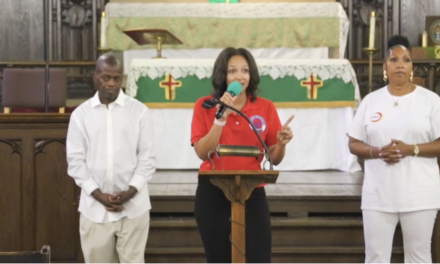In observance of Mental Health Awareness Month in May, a growing spotlight is being placed on a sometimes-overlooked demographic: ministers. These spiritual leaders play pivotal roles in their communities, providing guidance, support and solace to their congregations. However, the demanding nature of their responsibilities coupled with the societal pressures they face can take a toll on their own mental well-being.
With mental health awareness gaining momentum, discussions surrounding the unique challenges experienced by ministers in the Black church shed light on the importance of prioritizing their mental health and fostering a supportive environment within religious communities.
As Mental Health Awareness Month closes out, “American Black Journal” host Stephen Henderson has a frank conversation with Rev. Dr. Carla Spight-Mackey, a clinical specialist at Detroit Wayne Integrated Health Network (DWIHN), about the need for clergy to practice self-care, take time off and know when it is time to seek help. They talk about resources and ways ministers can get support. Plus, Dr. Spight-Mackey offers ideas on how to reduce the stigma surrounding mental illness in the African American community.
Full Transcript:
Stephen Henderson, American Black Journal, Host: We continue our series on the Black Church in Detroit, which is produced in partnership with the Ecumenical Theological Seminary and with the Charles H. Wright Museum of African-American History. As we close out Mental Health Awareness Month, we want to talk about the mental health of ministers. Self-care and taking time off are just as important for pastors as they are for everyone else. But often ministers put their own health and problems aside to care for others. I spoke with Reverend Dr. Carla Spight-Mackey of Detroit Wayne Integrated Health Network about the importance of ministers maintaining their mental health.
I’m really intrigued by this idea. The idea of care for caregivers is something that we talk about a lot right now in our culture, because more and more people find themselves in the role, I think, of caregiver than ever before. But in some ways, that means we’re not always thinking about people who have always been in the role of caregiver their entire careers or in some cases, their entire lives. And I think pastors fall into that category. They need care, too. And this is Mental Health Awareness Month. You’re trying to draw attention to the idea that they need mental health support sometimes as much as the rest of us do.
Rev. Dr. Carla Spight-Mackey, Clinical Specialist, Detroit Wayne Integrated Health Network: Absolutely. I think quite often we as the community, even though I’m a minister and serve as a pastor, I think that quite often we forget that pastors are the number one human. Number two, we as pastors…. suffer twice.
Let’s say it that way. I can say it that way because of course, throughout COVID and moving into where we are now, we have funeralized so many of our members and family and friends. And it’s not just going to do a eulogy, but it’s eulogizing someone, you know, and you take on that you empathize and are entrenched in it. And if we don’t take care of ourselves, you know, we could be worse off than the people we’re trying to take care of.
Stephen Henderson: Yeah. You know, as you point out, the pandemic was just absolutely terrorizing for religious communities in particular, as they had to bury their own and pastors lead the congregations in that exercise. But now we’re past that. And I feel like there are a lot of people who are saying, okay, well, we’re done with that and we can go back to, quote-unquote, normal, whatever that is. But the lingering effects of it, I think, are the thing that especially for pastors, I think look really different than what people might expect. Can you talk just a little about what pastors are dealing with now in the wake of everything that they’ve had to do in the last three years?
Rev. Dr. Carla Spight-Mackey: Well, and I’m glad you asked this. That’s a very layered question, and I’ll put it that way, because there’s the first layer of us dealing with the situation, but the aftermath. And we don’t often think of the trauma that is there. The underlying causes. What is still not taken care of, so to speak, because all of this is a journey, just like life is a journey. Every situation, every emotional, I’ll call it an attack is another journey that has to be healed through. And it and it requires us. I remember one of my fellow clinicians also said, you know, we need to step back and we need to quote-unquote “detox” because what happens is that trauma that those things that we haven’t dealt with are still there.
And, you know, I don’t know how many people know, but within our society, pastors have a high rate of suicide because of the trauma that is there. Those things that are underlying. Those things that haven’t been dealt with. And so that’s some of the after-effects and that’s where we are there. What sometimes are called walking wounded that it’s kind of not that anything is lightweight but it is lighter than those deeper healing things. You know pastors have had losses, you know, and I’ll be just transparent. I just lost my husband in March. And so walking in that if we don’t know how to step back, you know, people will ask often and we try to be the hero with the, you know, great cape on and always say God will take care of it. But God expects us to take care of ourselves to you know.
And so that aftermath is dealing with grief. It’s dealing with the rise of domestic violence. It’s dealing with the number of suicides and attempted suicides. It’s all of those things. It’s dealing with people who are stressed out and burnout while you as the pastor, the minister, the layperson working in ministry are also dealing with those things yourself.
Stephen Henderson: Yeah. So let’s talk about ways and places that clergy members can find support. It seems like it might be a little harder again because people aren’t always thinking about them as needing it. They can’t always go to the places that their congregants go, which is to the church and to the pastor. So how do you fill those gaps? How do you find the support that they need?
Rev. Dr. Carla Spight-Mackey: So one of the things that I think is very amazing is that many of the ministers, many pastors, folks working on the front line in ministry that I know have formed circles. So calling on each other, you know, to support each other through that. But also there is when COVID first started, the church I was affiliated with started a group called Grief Share. Grief Share is a national organization. It’s Christian based, and even lay people can run it. And so one of the things that happened for me is that one of my one of the pastors I know and are very close to said what you need to do is you need to find a Grief Share group that’s away from where you would be ministering yourself.
And they’re all over the place. And you can find them online just by going to Grief Share. Griefshare.com and they’ll give you lists of Grief Share groups that run and they’re 13-week programs and they’re just really awesome people who are walking that walk. But building a network in advance. Letting, being transparent enough to say you know what, today is not a good day. Today, I shouldn’t be in the pulpit. Today I shouldn’t be seeing people and then having your ministry set up. Such that you have kind of perused your congregation. Can identify those who are therapists and counselors and support people, you know, chaplains all over the place and making sure that they are available for your congregation. We cannot, you know, in this era, try to meet the needs of everyone, particularly if we don’t have time to take care of ourselves now.
Stephen Henderson: Yeah, I want to spend a little bit of time talking also about because it is Mental Health Awareness Month, the desperate need in our community, the African-American community, to emphasize mental health. That’s another barrier that Black pastors, of course, probably face as well. Is the stigma or the dismissal, I guess, of the importance of mental health. But this is the time each year when we really try to focus on that. And it’s still a big problem for us.
Rev. Dr. Carla Spight-Mackey: Absolutely. One of the I think greatest problems within the African-American community is built on shame. Like we ought to be ashamed if we’re not okay, whatever that means. It is, it is due time from my perspective that we validate that we have members in our community who are differently abled. They have issues that sometimes we don’t understand as laypeople and we need to as ministers, pastors, normalize that. We ought to be transparent about it.
We need to link into organizations like Detroit Wayne Integrated Health Network and get to know the provider network that is in the community near our church and get to know those people who run those organizations so that when our congregants show up, a lot of things are beyond our own abilities, our capabilities. And we need a clinician. We need someone licensed. And so it is a great thing for organizations to link into our network here in Wayne County. We actually have a faith-based committee. Many…. There are many ministers and pastors who belong to that committee and who do a lot of prevention work in their church. So it’s not voted null and void, but it needs to be more. We need to be more vocal about it because we have members in our congregation sitting in the pews, in the chairs who need to know that it’s okay to say you’re not okay.
Stay Connected:
Subscribe to Detroit Public Television’s YouTube Channel & Don’t miss American Black Journal on Tuesday at 7:30 p.m and Sunday at 9:30 a.m. on Detroit Public TV, WTVS-Channel 56.
Catch the daily conversations on our website, Facebook, Twitter and Instagram @amblackjournal.
View Past Episodes >
Watch American Black Journal on Tuesday at 7:30 p.m. and Sunday at 9:30 a.m. on Detroit Public TV, WTVS-Channel 56.




